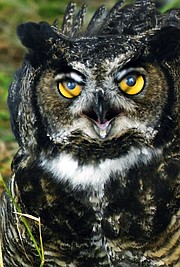Helping critters go home
Editor’s note: This is the second of a two-part series on wild “orphans.”
By KATHLEEN ST. CLAIR-McGEE
Contributing Writer
In North Idaho, we are blessed. We live in a region that still enjoys the closeness to nature. We also have three professional nonprofit organizations that will help when an animal is found in need. Please do not attempt to provide long-term care by yourself — with these groups available there is no reason. These three founders have dedicated their lives to this calling. The goal of wildlife rehabilitation is to provide professional care to sick, injured and orphaned wild animals so ultimately they can be returned to their natural habitat. Wild animals that have lost their natural fear of humans cannot survive in the wild. Wild animals that sustain injuries or illnesses preventing them from living successfully in the wild are euthanized (have their suffering ended in a humane fashion).
Wildlife rehabilitation is not an attempt to turn wild animals into pets. Patients are held in captivity only until able to live independently in the wild. Fear of humans is a necessary survival trait for wild animals and every effort is made to minimize human contact and prevent the taming of rehabilitation patients. Often wildlife rehabilitation is an elaborate and time-consuming process. Mystic Farms, Birds of Prey Northwest (BoPNW), American Heritage Wildlife Foundation (AHWF) are legally permitted to rehabilitate and release wild animals. Idaho does not allow wildlife “sanctuaries,” nor does it allow public tours of the rehabilitation facilities.
Wildlife rehabilitators work with veterinarians to assess injuries and diagnose a variety of illnesses. Due to the important differences between wild animals and domestic animals, rehabilitators need extensive knowledge about the species in care, including natural history, nutritional requirements, behavioral issues and caging considerations. Rehabilitators must also be able to administer basic first aid and physical therapy. They also need to understand any dangers the animals may present to rehabilitators. Dangers include physical trauma caused from bites as well as zoonotic diseases. Almost all birds are protected by federal law; state laws protect most other kinds of wildlife. To work with mammals, reptiles and amphibians, wildlife rehabilitators must be issued special permits from their state wildlife agencies. Before receiving these permits, individuals must meet various requirements such as specialized training, participation in mentorship programs, facility inspections, and in some states written or oral exams. Rehabilitators who wish to care for birds also must get permits from the U.S. Fish and Wildlife Service. Once they receive the permits, conscientious rehabilitators continue their education by attending conferences, seminars and workshops, keeping up with published literature, and networking with others in the field.
Because of their training, wildlife rehabilitators can help concerned people decide whether an animal truly needs help. Young birds and mammals should be returned to their families if at all possible; even well-trained rehabilitators are not equivalent replacements for biological parents. Rehabilitators can provide instructions on how to reunite wildlife families, keeping the safety of the animals and the rescuers in mind, and they can suggest humane, long-term solutions when conflicts arise between humans and their wild neighbors.
Hundreds of thousands of orphaned and injured wild animals were rescued this past year nationwide and many of the rescuers do call back to find out how “their” animal fared. Most of the time, they get good news. Many facilities have a better than 50 percent release rate. Often the caller asks if there is something they can do to help the center or wildlife rehabilitator who cared for that wild animal. The answer is a resounding YES. The best way to ensure that American Heritage Wildlife Foundation is here next time you need help is to remember us with a donation. Your contribution of money, or supplying a few needed items such as paper towels or newspapers helps on many levels. You can also donate your time. AHWF like many rehab centers across the nation is operated by volunteers only. We do not have paid staff, and we do not receive federal, state or local funds.
Even our small center that accepts less than 200 wild patients each year, the cost of food, caging and veterinary services easily can run into the $10,000. Most rehabilitators and wildlife centers have fundraising activities to help offset these costs, but there is nothing more welcome than a year-end donation. You can donate your time and talents to help organize fundraiser events or offer to be a “table sitter” at the outreach events. If you wish to donate but don’t know how, call (208) 266-1488 or go to our website www.ahwf.org and find the variety of links.
There are many wonderful and deserving charities that help wildlife, but when you find a wild animal needing help, your local, licensed wildlife rehabilitator is who helps you and the animal. Please consider sending a donation to help make sure the wildlife rehabilitator is still available in the future when you need assistance again.
- • •
Kathleen St. Clair-McGee is the founder of American Heritage Wildlife Foundation Inc. and serves as the nonprofit’s president on its board of directors. She can be reached at ahwf.org or by phone at (208) 266-1488.



